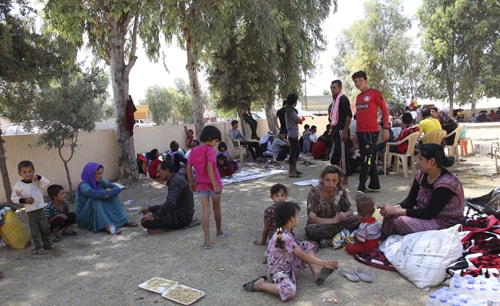US decides to take military action in Iraq after 13 years
(Baonghean) - After a period of considering options in the face of the increasingly unstable situation in Iraq, on August 8, the US President also decided to conduct airstrikes against Islamic militants in this Middle Eastern country. The airstrikes are the first US military action in Iraq since ending the 8-year war and withdrawing troops from here in 2011. Although trying to show the role of "protector" for Iraq, President Obama still affirmed that there will be no scenario where the US will send troops back to this battlefield.
 |
| Members of the Yazidi community flee the threat of Islamic State militants. Photo: Reuters |
| RELATED NEWS |
|---|
Fighting in Iraq has erupted after an IS offensive that has lasted more than two months, killing more than 150 Kurdish fighters and injuring about 500. And during this time, Barack Obama has not taken his eyes off Iraq to consider his options. The decision to launch airstrikes came only after a meeting with nearly 50 African heads of state at the White House, where all leaders realized that the Iraqis had tried their best but failed. The Yazidi group had to flee into the mountains to escape the IS gunmen. The final limit was that the Kurdish forces, America's closest allies in Iraq, had to abandon Iraq's largest hydroelectric dam and retreat to the city of Ibril, ceding control of the dam to IS militants. This means that the militants could flood cities or cut off water and electricity to large areas - a very dangerous consequence. Therefore, the US needs to stop IS in time, before Ebril - a strategic location, the capital of the Kurds, where the US Consulate is located along with about 800 soldiers sent to Iraq by Mr. Obama since the beginning of the year - falls.
Although emphasizing that the US “cannot and should not intervene in every crisis in the world”, Mr. Obama said that when thousands of innocent people on Mount Sinjar are facing a massacre, the US “cannot look away”. In a speech, Mr. Obama made it clear that “When we have a situation like that on that mountain, with innocent people facing violence on a terrible scale, when we have a mission to help at the request of the Iraqi government in this case, and when we have unique capabilities to prevent a massacre, then I believe the United States cannot turn a blind eye”. Perhaps because of this “legitimacy” that the US airstrikes on Iraq have been supported by a number of countries. German Foreign Minister Frank-Walter Steinmeier said that this is the only way at the moment to stop the advance of IS. French President Francois Hollande welcomed President Obama's “important decision” and pledged “support when necessary”. He also showed his support for the US by saying he would assist the US in humanitarian operations. And more importantly, the people in Iraq themselves felt the need for US support, many of whom were evacuating breathed a sigh of relief when they heard the news of US airstrikes on IS bases.
What many people are interested in now is the next step of the US to give the Iraqi people "a chance to move forward to a better future" - as President Obama said. Obviously, the US cannot lose face by ignoring Iraq in a state of chaos. However, the US also certainly has no intention of sending troops back to Iraq, because the previous 8 years of being bogged down in this battlefield were more than enough for the Americans. The US has declared that the US cannot solve the problem of Iraq with tens of thousands of soldiers or large-scale bombings, and at the same time called for the formation of a new government to build a dialogue mechanism between the forces in Iraq. Although President Barack Obama has avoided directly mentioning the resignation of Iraqi President Nuri al Maliki, saying that "the US does not have the right to decide who leads Iraq", according to experts, it is not difficult to see the dissatisfaction with Maliki. Therefore, it is likely that after temporarily stopping the advance of IS forces, the US will continue with diplomatic efforts, at least to get a certain compromise from the Iraqi government in narrowing the gap between the Shi'ite, Sunni and Kurdish factions.
Thuy Ngoc






